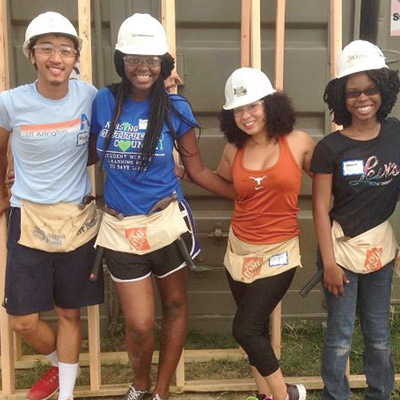
Rounds
Coretta Sigler enrolled in UTA’s v-BSN after serving in the Air Force.
Helping Veterans
Program offers flexibility and support for military members looking to transition to civilian job opportunities

Members of UTA’s Nursing Constituency Council volunteered to build homes for Habitat for Humanity in September. The council is a branch of student government that serves as a liaison between nursing students and faculty.
The new Veterans’ Bachelor of Science in Nursing program is opening doors for former medical military members looking to advance their nursing careers.
The first class began the 15-month v-BSN program in January 2014. Funding includes an almost $300,000 annual grant from the U.S. Department of Health and Human Services, announced in 2013. The program has admitted 16 veterans to date.
“The UT Arlington v-BSN program is achieving its goals of increasing the opportunities for veterans to translate their service experiences into civilian job opportunities, and it is helping us to better understand the unique needs of this important student population,” says Beth Mancini, associate dean in the College of Nursing and Health Innovation and principal investigator for the federal grant.
Coretta Sigler, retired Air Force, is part of the first cohort. She served as a military medic and EMT, and worked in labor and delivery, pediatrics, and internal medicine. But her military medical background didn’t easily translate to the civilian sector.
“It was kind of a downfall to have that level of experience and have to start all the way at the bottom. We just needed a hand up,” she says. “The v-BSN program is such an open door for us.”
The online program offers the flexibility Sigler needs to complete her BSN while working full time managing an infertility clinic at Texas Health Presbyterian Dallas. With her BSN in hand, she’ll have the opportunity to move into a director’s position.
The v-BSN is a “gold mine” for military medical personnel, she says. “We’ve always wanted someone to appreciate our experience—to just acknowledge the hard work, the training, and the level of responsibility we had in the military. This gives us a transition and something to look forward to.”
